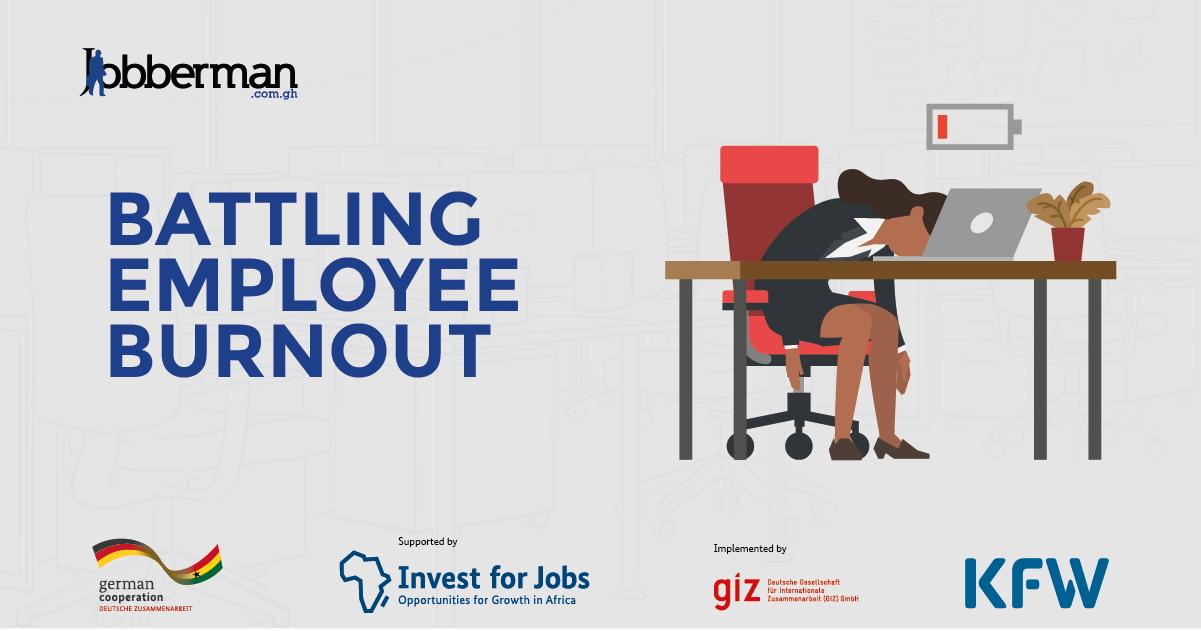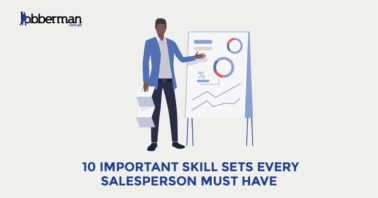From 2020 up till now, businesses are still recovering from the aftermath of the coronavirus pandemic. Although businesses adopted the new normal which was remote work, some businesses are back to the usual physical space of work or hybrid.
It’s been revealed that employees of all levels experience a certain level of burnout whether working remotely or back in the physical office space.
This has seriously influenced the world of work. Although this was a dire situation that influenced the way businesses operate.
So the question now is; how do we deal with employee burnout. We reached out to Heather Oshea, Group Head of Human Resource for Ringier One Africa Media (ROAM Africa), parent company of Jobberman Ghana for her insights with regards to the topic under discussion.
GA: Hello Heather, I am glad to have you help our audience get a deeper understanding of how employees and employers can manage workplace burnout.
HO: I am glad to share my thoughts with the audience, as well.
GA: As a human resource expert, what will be your definition of employee burnout?
HO: Burnout creeps in quietly – usually caused by chronic stress at the workplace – add to that the ongoing threat of Covid, has resulted in increased high-stress levels and burnout across organizations.
This often leaves staff feeling overwhelmed, not sure where to begin.
GA: Could you share with us what causes employee burnout?
HO: There is so much uncertainty around – this alone can contribute to burnout.
Not being with “people” the isolation we have endured over the last 2 years
Living behind a mask, constant worry and concern around the people you care about, and most “human” interactions happening via technology. Also, working from home, and not looking after yourself, by observing the same office hours as you would have in the office.
This may lead to:
Feeling tired all the time
Feeling “ratty”
Sadness for no apparent reason
Lost interest in things, that used to interest you
Finding it hard to get out of bed in the mornings – feeling exhausted.
No motivation
Not eating well

GA: Every business in the world was affected by the pandemic in one way or another. And we know how employee well-being matters. Do you think employees have fully recovered from the pandemic shock?
HO: Not as yet. We are living through a pandemic, where everything we knew has been turned upside down. We are not yet out of the woods, although the business world is slowly starting to recover, the shock of losing somebody due to Covid, or knowing somebody who lost their job, etc, will remain with us for a long time to go. We still have a way to go still – Covid remains real.
GA: Some companies had no option other than to downsize their human resource during the pandemic. Others also had no option but to slash salaries which was a very BIG challenge. As a human resource expert do you think this was a step in the right direction? And how does this affect employee engagement at work?
HO: The reality is that companies do need to survive, and the only area where most companies can save money is usually to downsize – by letting people go within the organization.
This should be seen as a last resort – and for those people who may not be retrenched, it is also very important to run a change management process, to keep current staff focused on the bigger picture – assurance that no more layoffs will happen, etc.
Staff need to feel safe during these uncertain times.

GA: Sometimes some employees may be experiencing burnouts in the workplace but may find it difficult to identify these red flags of burnout. What are some of the red flags that indicate an employee may be having workplace burnout and needs help?
HO: Sudden drop in productivity. Increased sick leave. Isolation from others, and they physically do not look well.
Stress can manifest in strange ways, like a stomach ache, or headaches that just will not go away. I would strongly recommend that they seek medical advice if this is the case.
GA: Employee burnout became a concern during the pandemic and it is still a concern. In what way can employers assist employees who find themselves in such situations?
HO: The first thing to do, is to check if your current health care provider has an option whereby people can counsel members telephonically.
H.R. plays a big part here, as in most cases, nobody in the organization is aware that their counterparts are battling – H.R. should then have a counseling session with the staff members who are battling and make the decision to either;
- Counsel them weekly
- Advise them to seek professional help and to caution them that asking for help is NOT a sign of weakness, but a sign of strength – that they have realized that they need external assistance to help them through their high levels of anxiety, possible depression, etc.
GA: According to some employees, the pandemic caused them to be more resilient and twice productive and efficient.
Now, employees who work from home tend to overwork themselves unconsciously. What are some of the control measures that can be adopted to check them?
HO: Since the Pandemic, we are all working from home, which means you don’t “switch off” as easily as if you were working from the office.
Rules for working from home:
- Start time is the usual time you start work.
- Take coffee / tea / breaks during the day, as you would at work.
- Get up from your home desk and walk around during the day – keep your mind active – as sitting behind your desk in back to back meetings is going to leave you feeling exhausted, overwhelmed and then the work only starts after the meetings.
- Prioritise: what needs to be done today, what can wait until tomorrow.
- Find a comfortable place to work from home – sitting on your bed is not sustainable
- Turn off your computers at the end of the day – family time is important, and that is the way it “used to be” when you would leave the office and head for home.

GA: Losing a job during the pandemic was one of the devastating experiences ever for some professionals. Now the number of COVID 19 cases has dwindled. Ex-employees of companies who downsized expected their employers to reach out to them for re-employment but that was not the case.
This has caused a lot more professionals to be stressed out and lose hope in search of jobs. What will be your advice for such people?
HO: Companies need to be aware and communicate with the employee that should financial times recover, that if their job becomes available again, that the company will reach out to make contact.
Once a staff member leaves the organization, they are often not aware if positions come up again once they have left.
H.R. should monitor this, and as vacancies become open, to reach out to the affected staff to consider if they will be able to come back.
GA: Every year new graduates join the labour market. Finding the right job is such a burden for some young graduates. What will be your advice to young graduates ready for the world of work?
HO: Young graduates getting ready for work:
- Get your C.V. together, highlighting your studies, what you do in your spare time, and other areas of interest to you.
- Practice your interview in front of the mirror – watch your posture and non verbal communication. Example: don’t fold your arms, as this may make you look defensive.
- Apply to large corporates who run Graduate programs – this should be done before you have completed your degree.
GA: Day in day out the world is evolving. The future of work demands that employees or professionals are resilient and prepared for it.
As a human resource expert with vast experience working with multinational companies and people from diverse cultural backgrounds, how does the future of work look like from your lens?
HO: Working from home is here to stay: We have seen it work – although often at the expense of working long hours.
Companies moving forward will need to work on a hybrid approach – 3 days in the office, 2 days at home, as many companies are now offering 100% remote work.
If companies want to stay competitive with enticing people to work for them, they will need to consider policies around the percentage of people in the office, remote working options etc, or you could well lose your staff if you insist they need to come back to the office, where other organizations are offering remote work.
GA: Thank you Heather, for taking the time to share such insightful information with our audience.
HO: Thank you for reaching out to me, Genevieve, my pleasure.
This article is in partnership with Invest for Jobs, an initiative of the German Federal Ministry for Economic Cooperation and Development, and has partnered with Ghana’s number one online recruitment platform, Jobberman Ghana. This partnership is aimed at contributing to the special initiative’s objective of improving economic conditions in selected locations and industry sectors in Ghana, as well as promoting investment for jobs.





